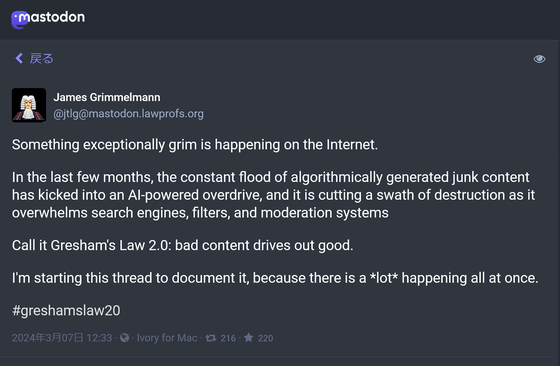What is 'Gresham's Law 2.0' that 'bad content drives out good content'?

Gresham's Law , an economic theory of money, states that ``If high-quality money and low-quality coins are in circulation at the same denomination, the high-quality coins will be stored or exported and disappear from the market, and the low-quality coins will be stored or exported and disappear from the market. This is the law that says, ``Bad money drives out good money.'' James Grimmelman , a law professor at Cornell University School of Law and Cornell Tech, calls the chaotic state of the Internet caused by algorithms and AI ``Gresham's Law 2.0'' and says, ``Bad content drives out good content.'' It points out various specific examples and problems.
James Grimmelmann: 'Something exceptionally grim is happening on the …' - Lawprofs Mastodon
https://mastodon.lawprofs.org/@jtlg/112052299948819084

Gresham's Law originates from Thomas Gresham, the 16th century financial advisor to the British king, who advocated that ``the reason why British good currency flows to foreign countries is because of currency reform.'' This is the theory proposed by. Gresham's Law states that if the amount of precious metals such as gold decreases and inferior coins are put into circulation, everyone will keep good coins with high value (containing a lot of precious metals) and use them for payments and transactions. Because they use bad currency, most of what is in circulation is bad money. Basically, this law applies to gold and silver coins under the gold standard system, and it hardly applies in the modern managed currency system where the value of money itself is not large, but it is generally said that ``Bad use of money trumps good use of money.'' It is sometimes used to mean 'to do.'
It has been pointed out that Gresham's law that ``bad money drives out good money'' caused the Lehman Shock - GIGAZINE

Citing Gresham's Law, Grimmelman said, ``Over the past few months, a deluge of AI-powered junk content has overwhelmed search engines, search filters, and moderation systems on the Internet. A very tragic thing is happening.This is called ``Gresham's Law 2.0'' in the sense that bad content drives out good content,'' he wrote on the microblogging SNS Mastodon with the tag ``#greshamslaw20.'' I posted it.
Grimmelman gives several examples of 'bad content that is destroying the internet.' According to a report by technology media 404media in February 2024, scammers extract the information of the deceased from legitimate funeral service pages and direct the bereaved family to their own Facebook account, forcing them to register for a fake funeral service. It seems that scams that steal credit card information etc. are rampant. A victim said, ``It's a despicable scam that causes even more panic on a day when you can't get the service you're originally looking for.''
Other examples include AI-generated food that looks nothing like the real thing in order to display better-looking food in advertisements, and TikTok that uses AI to combine gameplay footage of games such as Minecraft and clips of celebrities. Mr. Grimmelman cites as an example a report that says, ``You can earn tens of thousands of yen a month'' by posting a lot of articles.''
Regarding these Internet contents, according to a survey conducted by security company Arkose Labs, 73% of Internet traffic is made up of malicious bots and click farms (fraud).
More than 70% of internet traffic is used for bad bots and fraud - GIGAZINE

There are also reports that many low-quality news sites aimed at generating revenue with fraudulent clickbait articles are being created with the help of AI, and that SEO is worsening the usefulness of search. These issues are often brought up, with the claim that they exist creating controversy. Around March 2024, Google announced that it was taking action against bots and spam, revealing changes including a revamped spam policy aimed at eliminating AI clickbait from search results. Masu.
A major news site claims that ``SEO has destroyed Google search and turned it into garbage'' and receives fierce opposition from Google and the SEO industry - GIGAZINE

“Bad content that drives out good content” is not just fraudulent content. Articles that roughly introduce products, etc. that have not been actually reviewed by SEO personnel of major media outlets are displayed at the top of search engines due to SEO advantages, and it is difficult to find truly useful reviews. Grimmelman points out an example of how good content can be driven out. As another specific example, at Kotaku , a media outlet primarily related to video games, management decided to lower the priority of posting the latest news in favor of 'gaming tips and guides' that require less effort and can be updated more frequently. Grimmelman cited the example of editor-in-chief Jen Glennon leaving the company as a result of the switch.
Mr. Grimmelman's thread received many comments, including one pointing out that ``The only way to regulate fraudulent behavior by AI is for the government to legislate,'' and ``A search engine that is less susceptible to SEO than Google.'' There is also an opinion that using ``is a temporary measure.'' There were also comments calling Gresham's Law 2.0 the ' AI Kessler Syndrome ' by applying it to a model that simulates the risk of self-propagation of space debris.
Related Posts:
in Web Service, Posted by log1e_dh






